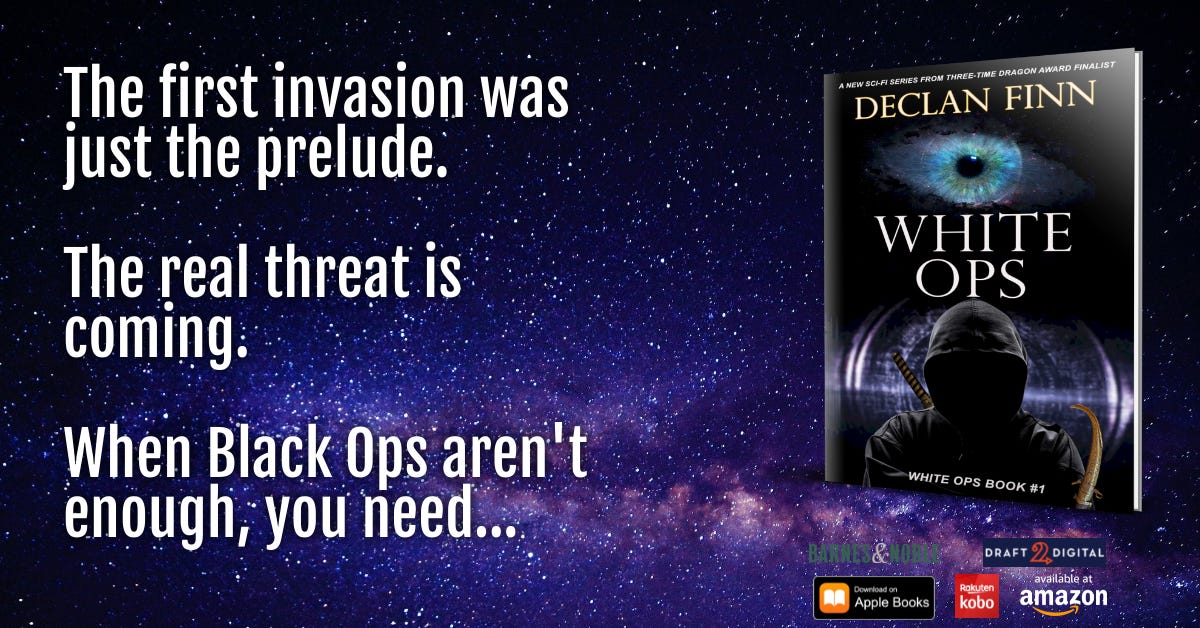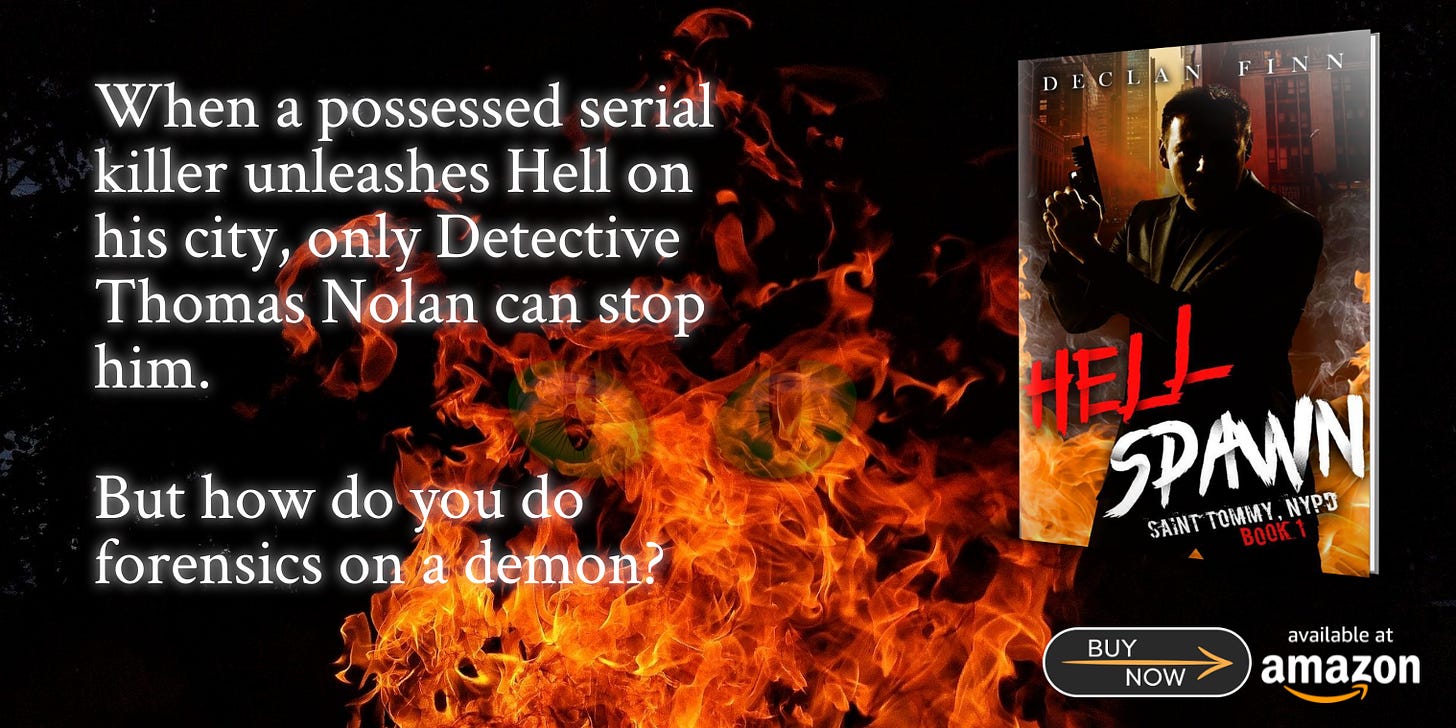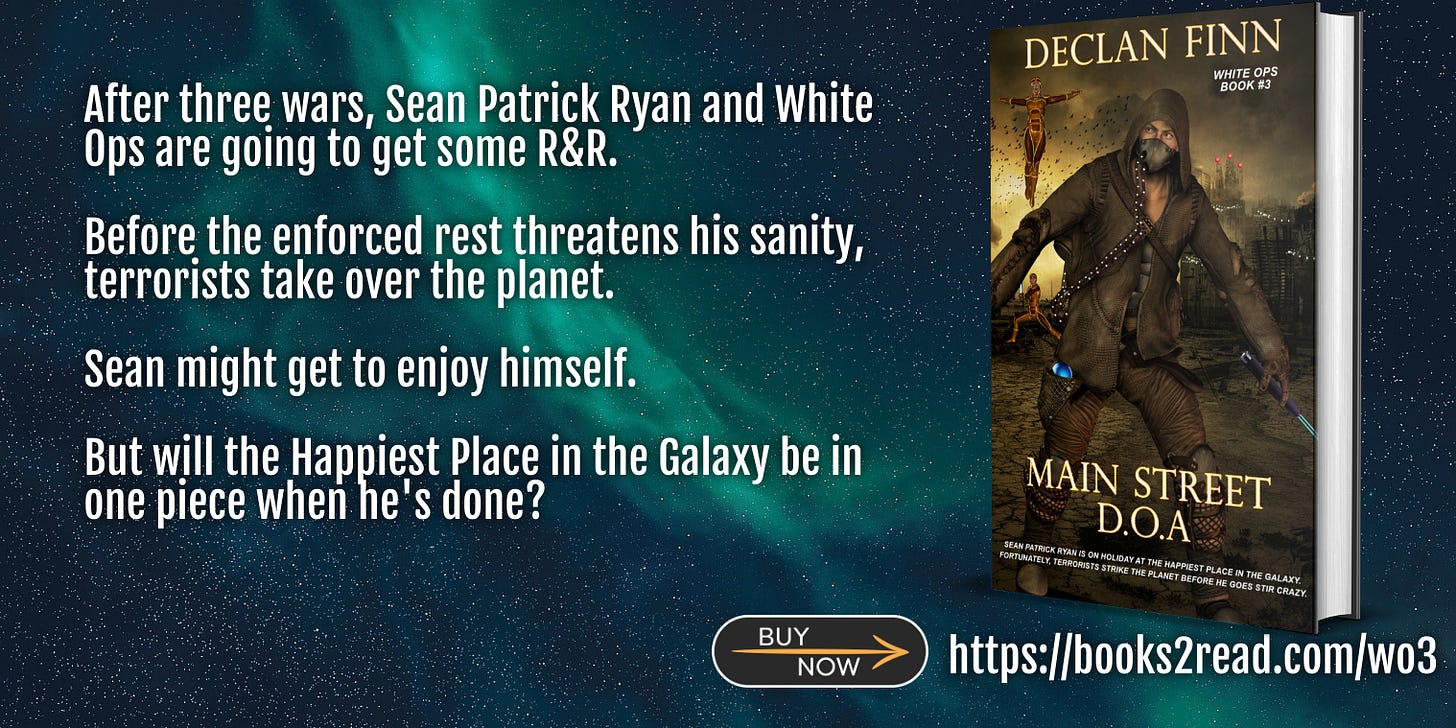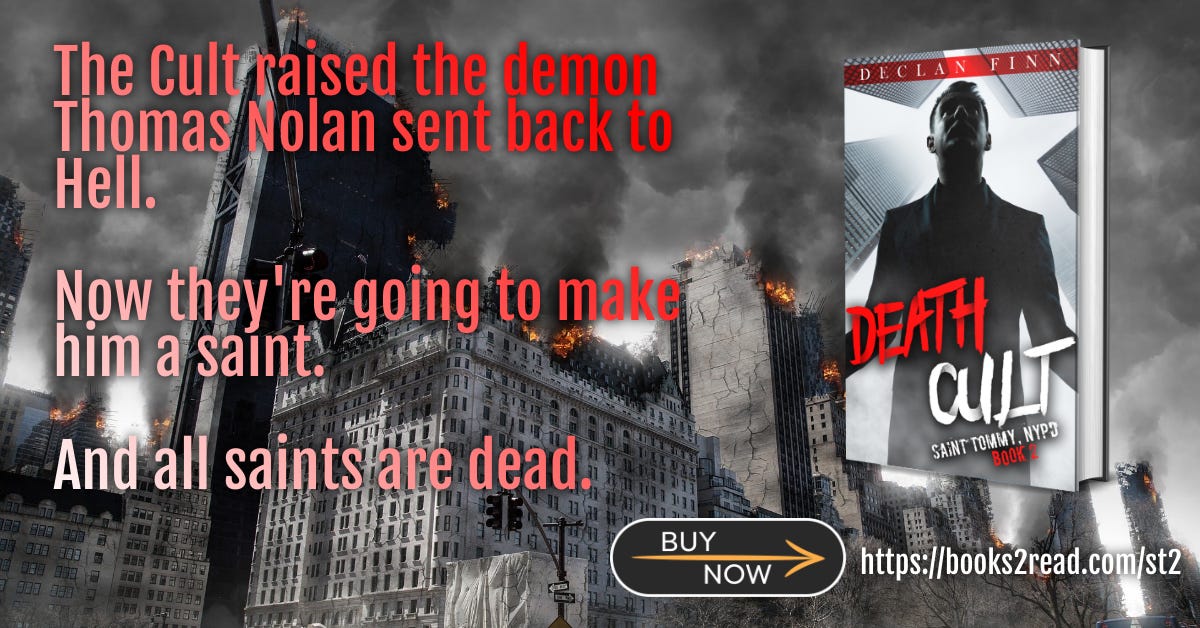It’s been a minute since I last posted. I’ve been strangely busy, and bored out of my mind. My editing group has been going through the last five books that I’ve written—not published yet. If you want a look, you need to glance at my Patreon for that. Or be a paid subscriber here.
While that was going on, I had to work on this speech.
Last week, I gave a little speech to a writing class. Apparently, in Texas, “I’m a local author” actually means something. Who knew?
So, here it is, everything you ever wanted to know about writing … that I could jam into a one hour course, with enough time to accommodate a Q&A session.
Howdy.
My name is Declan Finn, probably the most prolific author you have never heard of. In the last ten years I’ve published approximately 35 novels—because I stopped counting after 30. Professor McNichol has asked me to talk a bit about my writing, including how I got here.
First of all, if you want to write just to write … you can just do that. And you don’t have to take a single class in writing to do it. I personally started at 16, before I took my single writing class in high school. Back then, I created fiction around a science fiction TV show called Babylon 5. I watched the show, read everything about the show, started inserting my original characters into the corners of the show that were never explored. I created my own stories within that universe. At the time, I had not known that I was creating something called “fan fiction” because in 1998, I barely dealt with the Internet if I could avoid it.
Eventually, my fan fiction grew beyond the TV show, and generated original stories, world building, my own alien species. In 15 months, I had created over two thousand pages of text. And by that, I mean I probably made four thousand pages, because I was 16, I didn’t know that publishers used double spacing.
Orson Scott Card, author of the novel Ender’s Game, has been quoted as saying “The First Million Words are practice.” And my fan fiction probably covered half of that word count, if not more.
Keep in mind, much of this fan fiction was written during summers, where I could write in 36 hour stretches. I had no social life back then, since my books were more interesting than the people around me. So I had no problem locking myself in an office for hours on end.
Well before the end of those 15 months, I had essentially rewired my brain. I needed a notebook by my bed because ideas would not let me sleep until I wrote them down. I took notes on real life anecdotes so I could use them in a planned murder mystery set in my high school. I looked at locations with an eye to making them set pieces in novels. And I did.
So before anyone asks, “Mister Finn, where do you get your ideas?” the answer is that I approach life with a functional mindset and build stories out of whatever’s lying around.
Before I left high school, my fascination with writing led to me being branded a terrorist…
For those of you paying attention, that’s called “a hook.” It should catch the attention of your audience. If you intend to write fiction at a professional level, keep that in mind.
For the record, I had not actually planned to do anything to my high school. One evening when I was particularly punchy, I had fallen into the works of classical English comic operettas written by Gilbert and Sullivan in the late 1800s. You probably are familiar with some of their tunes, even if you don’t know the pieces offhand. But the one song that got me into trouble was a song called “I have a Little list.” I thought it was funny, and wrote a version based around my high school. Long story short, my parody got out among my classmates, which led the high school to try and throw me out for “acts of terrorism.” Please keep in mind, this was March of 2000, before 9-11 redefined terrorism for most people.
By the time I was in college, I knew I wanted to write novels professionally. I took history in college, because that’s where all the stories are. And trust me, there are some things that happen in real life that you can’t get away with in fiction. I was good at history, because they were just stories that actually happened.
In fact, I fell into one subject so hard and so deeply, I turned it into a trilogy of novels. Back then, it was trendy to create novels built around history. The history was terrible and the writing was garbage, but some of those books became so hyped, bookstores could make bestsellers out of trash. If you don’t believe that garbage can make money, I suggest you borrow a James Patterson novel from the library. The odds are good that the novel you grab would fail any writing class. But it doesn’t matter, that man can market a book.
You want to know where to get ideas from? One class during my own college days was “Christian Spirituality and Mysticism.” We spent one class discussing the charisms of saints: Padre Pio bilocated. Thomas Aquinas levitated—and since he was so fat he made his own jokes about it, that sounds worrisome. Saints who smelled evil. Saints who raised the dead.
My first thought was “Slap a cape on a saint, and you have a superhero.”
At “smelling evil” I thought “That would be useful for a cop.”
I immediately had a character who was a cop, with the charisms of a saint. So obviously, I had to have a possessed serial killer, because that makes sense, doesn’t it? A demonic criminal matches the protagonist. It became Detective Thomas Nolan, the lead character of my series Saint Tommy, NYPD. I milked that premise for 12 novels, and multiple short stories.
If you think a Saint as a protagonist is boring, I advise that you read Butler’s Lives of the Saints, and see just how colorful some saints are. Between saints who are flaky (such as Thomas Aquinas) Saints who didn’t even like other people (such as Saint Jerome, who liked his pet lion, and Saint Ambrose, the hermit down the street).
There is a fantasy author named Jim Butcher, best known for writing Fantasy. He got into an argument online. The discussion was about tropes—think of a trope as a meme in storytelling, from “the villain is really the hero’s father,” or “this scoundrel really has a heart of gold,” or even “this agent of chaos will do the correct thing, if only as a last resort. Jim Butcher’s discuss asked, “Can an overused trope be good if the author is good enough?” Butcher argued that a good author can spin a good story out of anything. It descended into a bet. Butcher’s opposition dared him to write a story based on an overused trope. Butcher insisted, “No, give me two tropes.” The tropes he was given was “Lost Roman Legion” in “the Land of the Pokemon.” He turned it into a series called Codex Alera, and made enough money to build a house from scratch.
So, yes, you can get ideas from whatever’s to hand.
Good news, if you can wire your brain into finding ideas everywhere, then you will never have writer's block. Since I was 16, writer’s block is what happens to other people. It’s also a handy paperweight that is easily thrown.
I’ve been asked to talk about “process.” I have discussed a bit about outlining. For the most part, outlines are suggestions. They’re the dots you have to connect. My first outline was for a Saint Tommy, NYPD novel called Hell Spawn. The outline dictated that there was going to be an entire chapter of my heroes pounding the concrete, going from one institution to another. But I was bored, and it was just easier to throw in a car bomb. Just because you outline doesn’t mean you’re locked into it if the needs of the story dictates that the pace needs to change.
My initial process with my fan fiction was to write a series of short stories and string them all together over the course of a novel. Later on, as I mutated the fan fiction into my science fiction series White Ops, I had to change a great many things. One story was a hostage taking of “Disney Planet,” and I turned the 30-page short story into a full novel about a hostage situation on “Yesdin Planet.” Please remember, big companies have lawyers.
Between writing short stories and outlining novels, I would build characters first and drop them into plots. From there, I would see how the pinball reacts to getting knocked around the machine. You’d be surprised how well that can work. The characters will make decisions you, the author, will not see coming. But sometimes they work. And sometimes they don’t and you have to backtrack, dragging your characters kicking and screaming all the way.
If I talk like your fictional characters are real people, who act like they have free will, this is why I call writing “Legalized schizophrenia.” When you build people from scratch, and you know what their parents and their grandparents did, you create their hobbies, their likes, their dislikes, you’d be surprised just how real they can feel. Occasionally, I have picked a person and I liked the rhythms of their speech, so I just create a voice filter, where I have a specific voice say what I write, and see if it matches.
Your next step after you write, is editing. Personally, I cannot edit something I write. I have to put the draft aside, work on something else, and come back to it when I have forgotten parts of it. Why do this? Because sometimes, you can read a sentence, and you read what you meant to write, not necessarily what’s on the page. When I started out, I would run one manuscript past my entire family of readers. My mother would read the newspapers and correct it. My sister was an English major, so I put her to good use. My father was good at conceptualization and execution. So I had an editing team to work with from the time when I was 16.
If you cannot assemble that yourself, you’re going to have to pay for it, and that can get very pricey very fast.
When editing, please get out of your own way. If you are not familiar with the term “murder your darlings,” it’s the point in editing when you have a line, or a paragraph, or a page, where you just love everything about it. It is so good. It is so awesome. And you may be forced to delete it. Or at least cut it from this book. As I said before, I cut a chapter an outline for Hell Spawn because it killed the pacing.
However, that chapter managed to fit book two perfectly. Sometimes, you have to murder your darlings. But, you never thrown anything out, because you don’t know what comes in handy later.
And yes, editing can be painful. The last two book projects I worked on, I cut fifty thousand words from one book, and 75 thousand from another. For those of you who want to do the math, that’s 200 pages from one book, and 300 pages from another.
My simple advice with dealing with edits is simple: Do Not Take It Personally. Some things don’t fit. Some things will kill the pace. Some elements will just be out of place. It happens. Do not spend your time fighting with the editor who made the comment. Try to objectively evaluate the edit, fix it as best you can, and move on.
A quick side-note to this: Sometimes, the elements of your writing you have to spike may be tantamount to preaching. I know it’s unlikely that any of you will have that problem at this stage of your life. However, books may touch on subjects you feel strongly about. I had an opportunity to preach in Hell Spawn. It’s a long story, but suffice it to say that my villain was part of a politically protected occupation. I brought in the villain’s employer, and she waxed poetic about the profession for maybe five pages. I did not put in my opinions. My character voiced no opinions. In fact, the opinions expressed were only the ones I disagreed with, taken directly from real-world sources. I quoted real world quotes stuffed into the character’s mouth.
I still had people whine that I was preaching by making the other side “too cartoonishly evil.” The moral of that story is, sometimes you just can’t win.
While I have talked about the creative side of writing, there is something I must stress. And I’m not sure that I can stress it enough. Yes, you can “just write,” and let it sit on your harddrives and in your notebooks. That’s fine. But if you intend to make money off of your writing, writing is a business. If someone tells you that writing is art, and that someone spins lofty notions that disregard thoughts of profiting from your work, tell them get thee behind me Satan, because they are not helping. Art has never been separate from money, and I’m not talking about modern day money laundering.
Personally, as a full-time writer, I write full time. It’s a 9-5 job. Sometimes, an 8-6 job. And if you have the house to yourself, you can keep writing until you can’t see the screen anymore. I don’t recommend that, because you’re going to spend more time the next day trying to figure out what you meant to say, because the last paragraph or two will be gibberish.
But don’t worry, it gets worse. Because if you become “a writer” because you think that will get away from people, you’re wrong. You are so wrong. Because after you’re done locking yourself alone in a room with your manuscript, then comes selling the product. And I don’t mean selling it to a publisher. That’s a different problem. Whether or not you self publish, or go into traditional publishing, you will have to sell the book. While James Patterson has largely devolved into one of the worst writers on God’s green earth, he makes money by being a marketing machine. In fact, he is one of only 300 authors who sell more than 1000 copies of a book in a year. 96% of the book market does not sell more than 1,000 copies a year. Which means that most of the books on the shelves of bookstores do not make the author more than $2,000 a year. Anyone working a minimum wage job will make more than that working for two months, while putting in the same ten hours a day.
So, hate to break it to you, but if you want to write professionally, you will have to do the majority of the selling. It is the bane of my existence. I don’t know what your age bracket thinks about social media, but I am literally on every platform known to humanity, and some that aren’t. Sometimes, my 9-5 involves getting into a flame war online because someone doesn’t like that you’re X, or Y, or Z. Maybe they don’t like your face. They don’t like your tone. They don’t like your book. Sometimes, they don’t like the fact that you have published, they’re still on page one of their grand masterpiece, and they need someone to go after.
Both threats to my life have come over my writing. I already told you one of them. In the age of social media, I don’t see that risk going away.
Personally, I tried getting into traditional publishing in 2010.
Correction: I spent three years submitting two different book series to dozens of agents from 2007-2010. I stopped counting rejections around the 300 mark.
In 2010, I had an agent and everything. Problem: I had gotten a footnote at a time when major publishing houses were firing people in job lots. After two years of my agent trying to get me a hearing at a publisher, I gave up. I self-published. Between 2012 and 2014, I had published a murder mystery and five thrillers. I kept sending out queries to publishers, until I was personally invited to send to someone I knew online who was an acquisitions editor. Perfect, right? They accepted my vampire novels. The first one got published. Excellent.
The publisher was bought out two months later. I ended up self-publishing all four four vampire novels. And I caught the attention of another publisher. They published nine of my ten novels. They then published my next 8 novels, my Saint Tommy NYPD series. Perfect setup, right?
That publisher folded two years ago. I now have three publishers, only because I knew them all personally through a decade of working my butt off.
Oh, and even when I had a publisher, I self-published another murder mystery, two more thrillers, and a history. Because unless you’re going to play in one genre exclusively, you may need more than one publisher. There are some authors who use a different pen name for each genre they write in. I don’t recommend that, but you may draw a different conclusion than I did.
Do not scoff at self-publishing your own work, or going into the independent publishing route with smaller publishers. Believe it or not, self-published and independent works are over half of the book market these days. I don’t mean that they’re half the output, I mean that they are half the sales. That’s the number that counts.
If you want my advice about writing … knock yourself out. Write whatever you want, whenever you want. But learn from my mistakes, and be careful who you show it to, if anyone. Write what you know? You don’t have to. No one wants to know about my grandfather the drunk, my grandmother the sociopath, and I, personally, am very boring. I’m 42, and my life has only been threatened twice. That’s not enough action for even one of my own novels. A bestselling author like David Weber does not lead space fleets, no matter how often he writes about it. I am not a police officer nor a saint. Nor am I a vampire. I am clearly not an action hero. Stephen King is … technically … not a demonic clown, no matter what his behavior indicates otherwise.
If you want my advice on writing professionally?
First, read. Read fiction to keep your mind open, and read nonfiction to see just how odd reality is. I find that you write what you read. If you’re writing science fiction or action, read some Edgar Rice Burroughs at one end, and some Timothy Zahn at the other. You can learn from everybody. Sometimes, you learn what to do, and sometimes, you learn what not to do.
Second, write on a schedule. As a professional, I write from 9-5, every weekday. The book will not write itself. You probably won’t have that amount of time. But even if you carve out thirty minutes every day, and write one page a day, 365 days is a whole novel.
Third: To write professionally, gain some knowledge of the field. Look into traditional publishing, and decide if you want to go into it. Given the current conditions, I don’t recommend it. But they may change by the time you get around to making something you think is publishable.
Item four: remember, this is a business. At the very least, read some books on marketing. If you’re heading to college, perhaps take a course on it. Also, get some experience in graphic design. Trust me, as someone who made two of his own book covers, you will want to have experience with graphic design. AI is not going to do all that work for you. Either that, or get some friends in the business and art departments.
Final bit of advice: I said you don’t have to draw on personal experience to write. You don’t. But please do some research. If you’re writing action novels, go to a gun range, and go to a self defense class where you have to hit something, and perhaps block a few punches.
Anyway, that’s pretty much everything I know in one easy package. As an author, I hear a lot of random people tell me that they want to be a writer. I will tell you simple that, no, you don't. Seriously, you don't.
Frankly, yes, you can hotwire your brain to write. It's relatively easy. I did it to myself when I was 16. I wasn't even trying. I just wanted this idea out of my head. Half a million words later, I had novels on my hands.
To be a writer, your brain is basically ON all the time.
You're (re)writing TV shows and books. You're calling plot twists.
When the story goes a different way, you want to rewrite it because your idea really was better.
That news story is now part of your thriller.
Your demonic plot to destroy a city becomes current events within a year or two. I’ve had that happen more often than I like to think about.
Sometimes, you're basing people on friends. Then your friends are asking how you came up with this great character... that they don't recognize as themselves.
You didn't pay attention to that conversation with friends / family about something really important to them, because something they said ten minutes ago started a plot outline in your brain.
Your brain occasionally overclocks from writing from 8-6, occasionally remembering to eat.
You take a break so your brain can cool down, but then the compulsion to keep writing presses on your brain like a heavy blanket.
You need a notebook next to your bed so you can make notes-- because the ideas don't let you sleep until you write them down.
There's a difference between "I want to be a writer" and "I have to be a writer."
If you want to be a writer ... no, you don't. If I had my druthers, and could do it all over again, I'd have been an electrician or a plumber. I'd probably be using electricity to kill people in murder mysteries, but I'd have a 9-5 job I didn't have to take home with me.
If you HAVE to be a writer? If you are compelled to write. Then you don't really have a choice. Damn the torpedoes and full speed ahead. And good luck.





No comments:
Post a Comment
Please, by all means, leave a message below. I welcome any and all comments. However, language that could not make it to network television will result in your comment being deleted. I don';t like saying it, but prior events have shown me that I need to. Thanks.